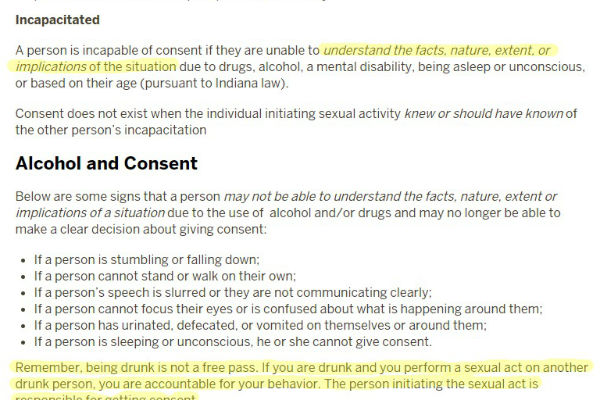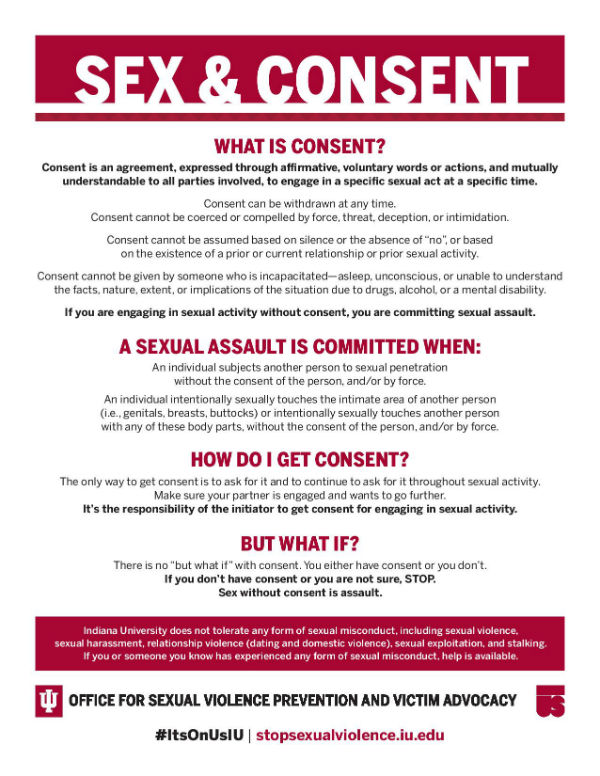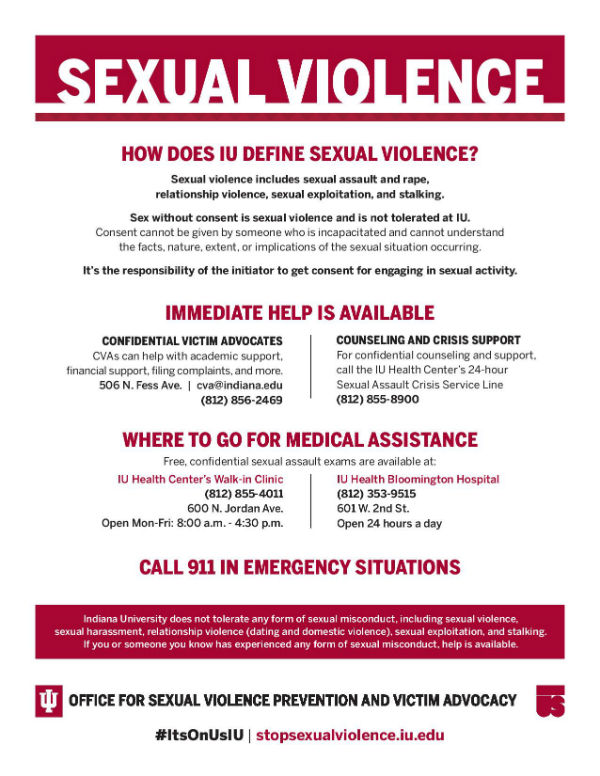
Policy mentions both ‘incapacitated’ and ‘drunk’
A student’s campaign to shame her university for how it handled her reported rape has raised questions about the school’s definition of sexual consent – and whether its messaging on the subject is consistent.
Ellie Johnson has been tweeting against Indiana University-Bloomington for three weeks, accusing the public school of repeatedly violating Title IX and ignoring her evidence of the accused student’s guilt.
While the hashtag #WeStandWithEllie has gone viral and Johnson has put her claims into concrete action, filing a Title IX complaint with the federal government, the public has largely overlooked how IU communicates its sexual-consent policy to students.
The College Fix reviewed website policies and flyers provided by the administration to learn whether students might come away with different ideas of when sexual consent is not possible, based on where they saw the message.
Johnson’s claims may have struck a chord because the university was under Title IX investigation by the Department of Education for nearly two years for its response to a 2015 complaint. The Office for Civil Rights cleared IUB of wrongdoing in February of this year and issued “no finding” conclusions for four complaints that were filed during the review.
The Title IX official who oversaw the 2015 complaint, Jason Casares (below), was also accused of sexually assaulting a colleague in the Association for Student Conduct Administration in 2016. He resigned from IUB less than a month later.

https://twitter.com/efitzj/status/1011358079433297920
‘Unable to understand the facts, nature or implications of the situation’
“I would like to announce that Indiana University let another privileged, white rapist walk,” Johnson wrote in her first tweet June 25, which has received about 2,300 retweets and 5,200 likes as of Monday night.
Johnson claimed the male student admitted to sexually assaulting her in his text messages. The university threatened to withhold her “medical documentation” from the Title IX hearing panel if she didn’t share it online “for my rapist to have and screenshot in the privacy of his home,” Johnson wrote.
The hearing panel determined Johnson was drunk during the encounter but judged that she could consent based on “my ability to navigate the room,” she tweeted.
“They took his word over mine and said that because we had hooked up drunk previously, that I was able to provide consent that night too,” Johnson wrote. In another tweet, she said “No, IU’s policy ‘drunk consent is not consent’ was not considered.” She claimed that this policy was “plastered on every bathroom stall.”
https://twitter.com/efitzj/status/1011786991782985728
https://twitter.com/efitzj/status/1011945928494854144
IUB’s webpage on “definition of consent” doesn’t go that far. It says students can’t sexually consent if they are “incapacitated,” meaning they are “unable to understand the facts, nature, extent, or implications of the situation.”
Signs of incapacitation include “stumbling or falling down,” slurring speech and “not communicating clearly.” But the university then uses the word “drunk” to lay out the “initiating” student’s obligation to a sexual partner while both are intoxicated. It says being drunk “is not a free pass” for failing to obtain consent from a partner (below).
The policy was apparently revised between the 2015-2016 and 2016-2017 school year, judging by screenshots from the Internet Archive.
A February 2016 screenshot suggests that a person becomes incapacitated due to the actions of an assailant: “Alcohol and drugs can be used as a way to incapacitate a person so that they are less likely to say no or fight back.” It provided a list of “obvious signs that a person is impaired by alcohol and/or drugs and can no longer make a clear decision” regarding consent.
By August, however, the policy was rephrased to suggest that students can incapacitate themselves without another person’s malicious intent. Signs of incapacitation were also rephrased more cautiously: The university listed “some signs” that a person “may” be incapacitated and “may no longer be able to make a clear decision” about consent.
The policy remained the same in one respect: Both versions equated incapacitation with being “impaired by alcohol and/or drugs,” which could be translated “drunk consent is not consent.” (A month later, this sentence had been removed.)
MORE: Indiana U. produces a musical to tell students how to have sex

Flyers don’t mention ‘drunk’ – do others contradict it?
When The Fix showed Johnson the current written consent policy, she responded in a tweet that she had been incapacitated but claimed again that “there are signs in every bathroom stall on campus that says you are unable to provide consent when you are drunk.”
Charles Carney, director of media relations for the university, confirmed to The Fix that “[r]estrooms across campus feature fliers posted in stalls with a variety of messages, all including key contact information for people who may be in trouble and need quick and confidential help.”
Like the university’s sexual-consent websites, he wrote in an email, they “outline many of the details about how to spot and handle sexual misconduct.”
Carney provided two variations of these flyers (below) to The Fix. They emphasize that the “initiator” is responsible for obtaining sexual consent and that consent must be requested and confirmed “throughout sexual activity,” not just at the beginning: “Make sure your partner is engaged and wants to go further.”
But neither includes the word “drunk.” They say consent is invalid when a person is “incapacitated—asleep, unconscious, or unable to understand the facts, nature, extent, or implications of the situation due to drugs, alcohol, or a mental disability.”
Carney also provided a link to the university’s sexual-misconduct brochure, which defines incapacitation but doesn’t mention “drunk.”
The flyers the university posts in restrooms “have no wording of any sort that says ‘drunk consent is not consent,’” Carney said.

MORE: Male student’s suit against Indiana U. says female coerced him into sex
Asked about the ambiguous language on its consent webpage that mentions both “incapacitated” and “drunk,” Carney told The Fix that “we widely promote our policies” on “intoxication and consent.”
The Fix reached Johnson on her Facebook page after she stopped responding to messages on Twitter. She said she was wary of answering questions because her responses could compromise her case, but said she would try to get photos of the flyers that she mentioned in her June 26 tweet.
The Fix later showed Johnson the flyers provided by Carney. She has not provided photos of the flyers she mentioned, nor answered whether Carney’s flyers are the same ones she saw.

Tweets supporting Johnson include ‘inaccurate information’
The university’s public responses to Johnson’s allegations do not address her claim that IUB tells students “drunk consent is not consent.”
“We appreciate the concerns expressed in this circumstance and recognize that this is a very difficult situation,” it tweeted June 26. The university said it had “comprehensive processes for responding to reports of sexual misconduct” and makes “continued efforts to provide support and resources to all students, faculty, and staff in this regard.”
It apparently released a longer statement following criticism, including one that called its statement a “generic unconcerned tweet.” The full statement Carney gave The Fix, dated June 26 but apparently not posted on IUB’s website or social media, said it can’t “compromise the privacy” of students by responding specifically to Johnson:
[W]e can confirm that this case was investigated thoroughly and fully deliberated consistent with IU’s policies and procedures, which are designed to help ensure due process and fairness to all parties. A three-person panel, pulled from a pool of faculty and staff who receive extensive training in matters of sexual assault, carefully considered all facts and evidence presented and rendered its decision, which is based on a preponderance of evidence. The panel’s decision was also affirmed following a separate, independent review upon appeal.
It followed up July 3 by claiming that “many” tweets supporting Johnson “include inaccurate information that does not reflect the care and consideration demonstrated in this and all such cases.” It reiterated that its three-person panel applies a “well-established set of standards.”
As social media posts regarding the outcome of an alleged sexual assault investigation continue, we want our students and community members to know that we hear your concerns. Please see below for more and at https://t.co/aSILXdy9gK. pic.twitter.com/fbRuWe4JKl
— IU Bloomington (@IUBloomington) July 3, 2018
This week, Johnson posted screenshots of university contacts from IUB’s website and encouraged followers to “express your feelings on campus safety, university policies, and the culture of sexual assault.” They include the president, general counsel, student affairs and Title IX personnel.
She has also tweeted at other universities in Indiana to ask how they keep their students safe on campus.
https://twitter.com/efitzj/status/1011786352491364353
https://twitter.com/efitzj/status/1011796241162883072
https://twitter.com/efitzj/status/1011964640505614338
Though Johnson has since used her social-media following to speak more broadly on campus sexual assault – such as asking followers to finish the hashtag #RapeCultureIs – her main goal is changing IUB policy.
She wants the university to enact a “zero tolerance policy” toward alleged rapists on campus, and has promised to stage “peaceful demonstrations” against IUB until it does so.
That may be an uphill battle. The university’s Indiana Prevention Research Center is a skeptic of zero-tolerance policies in the context of public schools, saying they are “ineffective” and disproportionately affect African-American youth. Such policies typically concern “weapons, bullying or drugs on school grounds,” however.
MORE: Title IX bureaucrat accuses peer of sexually assaulting her
IMAGES: Dusan Petkovic/Shutterstock, Indiana University-Bloomington
Like The College Fix on Facebook / Follow us on Twitter






Please join the conversation about our stories on Facebook, Twitter, Instagram, Reddit, MeWe, Rumble, Gab, Minds and Gettr.